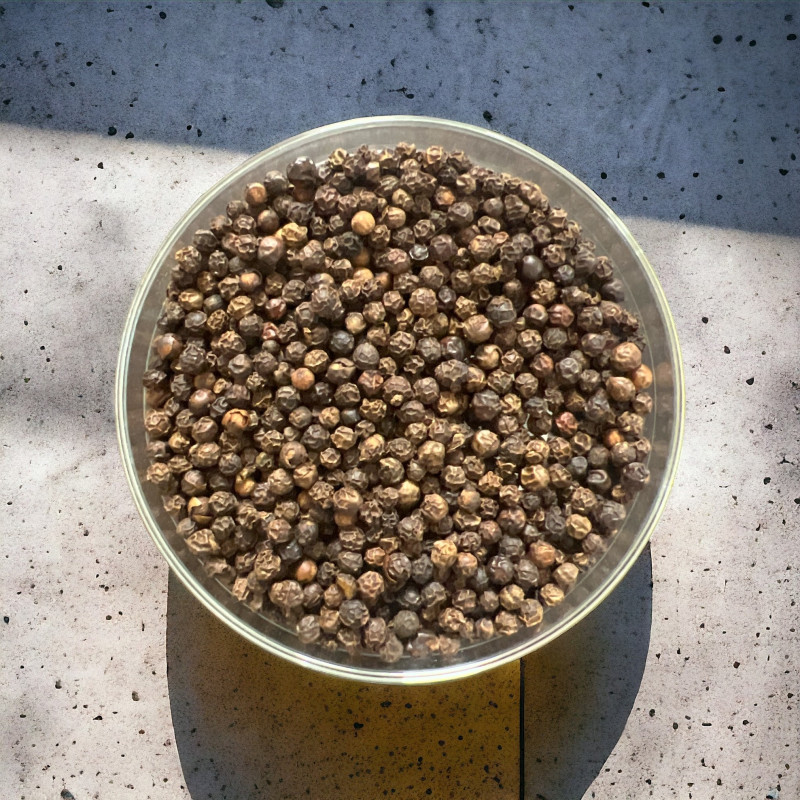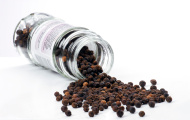
Reference: poivre5baiesE


Its aroma is fruity and spicy. On the palate, it is powerful and fragrant.
It is ideal for enhancing all your dishes.
 Delivery
Delivery
Mondial Relay
 Returns
Returns
See conditions
 Payments
Payments
100% secure
Produit livré en sachet refermable avec étiquette à repositionner sur votre contenant
°°°

Uses in Cooking:
On the nose, this pepper has a fruity and spicy aroma. On the palate, it is powerful, fragrant, and fruity. Its color is dark brown, and its grains are small (about 3 mm in diameter) and very wrinkled.
It will happily flavor all your dishes, especially meats and fish. It should obviously be passed through a mill or crushed in a mortar.
Who am I?
Origin: Vietnam
Scientific name: Piper nigrum
Pepper is a spice derived from the berries of the pepper plant (a member of the Piperaceae family). There are several varieties found around the world. Black, white, and green peppers are all from the same fruit harvested at different stages of ripeness, originating from the same exotic vine: the pepper plant (Piper nigrum).
Piper nigrum produces in order, depending on the maturity of its fruits:
Green Pepper: This is picked first, long before maturity. It is preserved in brine or dried. It is strong and pungent, similar to black pepper, as both retain their skin.
Black Pepper: This is harvested when slightly more mature but still before full ripeness. It is reddish in color, and drying turns it black and wrinkles its skin. This skin is what makes it so strong and pungent. It is the most widely used pepper in the world and is known for pairing well with almost all spices.
White Pepper: This consists of fully ripe berries that are soaked to remove their skins and then dried until they turn white. It is considered to be less pungent than black pepper, with a finer taste. It is different from black pepper, regardless of the pepper's origin, and has the advantage of not leaving black specks in white sauces.
While the cultivation of pepper began in Malabar, it has since spread worldwide: Southeast Asia (Indonesia and Malaysia), Madagascar, and Brazil. Recently, Vietnam has become the largest global producer of pepper. There are as many varieties and different flavors of pepper as there are places where they are cultivated, similar to wine, with terroir and climate playing a significant role in the pepper's taste!
Only the fruits of Piper nigrum (which produces the traditional black, white, and green peppers), Piper cubeba (cubeb pepper), and Piper longum (long pepper) are typically allowed to be called "pepper." However, as is often the case, custom has sometimes ignored these restrictions, and many berries that are not technically "pepper" are commonly referred to as such!
Pepper owes its spicy flavor to amides of piperine.
A Little History:
In Greece, under Alexander the Great, pepper was already in use, as it was among the Romans in antiquity.
Due to their high price, pepper and other rare spices were used as currency after the Arab conquest of Alexandria in 642 CE. This is where the expression "to pay in cash" (derived from "spices") comes from! Prices were such at the time that a person's wealth was assessed based on the amount of pepper they owned…!
The exorbitant price of pepper in the Middle Ages and the monopoly on its trade held by Italy were among the reasons that motivated the Portuguese to find a sea route to India. After Vasco da Gama discovered this route in 1498, a treaty was signed granting the Portuguese exclusive rights to half the world, including the origin of black pepper. A century later, they lost their monopoly to the Dutch (with their East India Company) and the English.
It was during the Renaissance, with the development of trade, that the price of pepper began to decrease.
Data sheet
Specific References
Reference: poivre5baiesE
Reference: 508207101
Reference: poivrevoatsE
Reference: Kubebe
Reference: poivreEbiosaotome
Reference: poivrenoirconc
Reference: poivresichuanV
Reference: 9N7644901
Reference: 6N745801
Reference: poivreBEviet
Reference: poivrevoatsE
Reference: 10N7699901
Reference: SriLankaBlanc
Reference: pimentjamaiqueE
Reference: 6L5609802
Reference: 1N7049301
Reference: 2N70996502

Its aroma is fruity and spicy. On the palate, it is powerful and fragrant.
It is ideal for enhancing all your dishes.